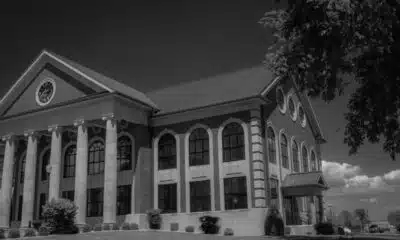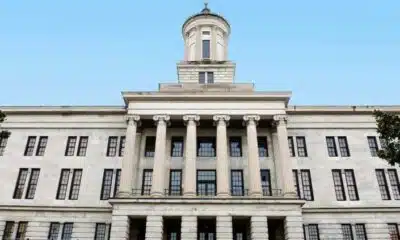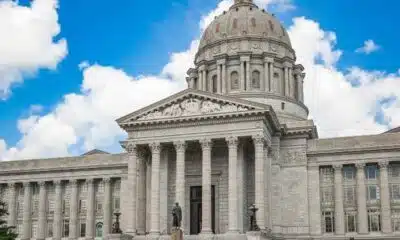News from the South - Texas News Feed
Texas’ era of state budget surpluses may be coming to an end
“Texas lawmakers have gotten used to state budget surpluses. That era may be ending.” was first published by The Texas Tribune, a nonprofit, nonpartisan media organization that informs Texans — and engages with them — about public policy, politics, government and statewide issues.
Sign up for The Brief, The Texas Tribune’s daily newsletter that keeps readers up to speed on the most essential Texas news.
The era of massive state budget surpluses in Texas could be coming to an end.
As the last of the federal government’s COVID-19 emergency funds are spent and sales tax revenues return to historic averages after a large spike, budget analysts say state lawmakers will have far less wiggle room when it comes to funding their spending priorities.
“I don’t think we’re in any kind of crisis, but I think the days of big budget surpluses are probably over,” said Bill King, a fellow in public finance for Rice University’s Baker Institute of Public Policy. “We’re going to be very careful how we spend money.”
In addition to federal pandemic aid, sales tax revenues from inflation and a post-lockdown economic rebound led to state budget surpluses. Texas lawmakers leaned on a $33 billion surplus in 2023 to pay for an $18 billion property tax-cut package, a $5 billion infusion for the new Texas Energy Fund and a host of infrastructure projects. Lawmakers entered this year’s legislative session with a $24 billion surplus, which helped to maintain previous tax-cuts; upgrade energy, water and broadband infrastructure; and cover other new spending items in the upcoming two-year budget cycle.
In fiscal year 2024, however, the state saw a 4% decline in revenue, the sharpest year-over-year decline since the Great Recession, and the first decrease since 2017. The first nine months of fiscal year 2025, which began in September and ends in August, saw 2.56% revenue growth from last year, according to the state comptroller’s office, a figure well below the 6% annual rate of growth the state has averaged since 2003.
The comptroller’s office now forecasts minimal growth in revenue in the coming years.
State Sen. Paul Bettencourt, R-Houston, said legislators have been expecting the dip in revenues and the state is prepared to maintain a balanced budget. He said the large property tax cuts of 2023 were necessary relief for property owners, but the Legislature also limited the amount of new property tax cuts it funded during this year’s session.
“What you’re seeing is we’re going to try to make our long term commitments and make sure they’re sustainable, but we’re also not trying to go overboard either,” Bettencourt said.
Federal funds have long made up about one-third of the state budget, but the pandemic saw a significant increase in those contributions. In fact, federal dollars accounted for 48% of all of the state’s revenue in 2021, according to a study of the state’s income by King and Baker Institute fellows John Diamond and Joyce Beebe.
A total of $85 billion in COVID relief funds had been sent to the state through February of this year, according to the Texas Legislative Budget Board.
The comptroller’s office forecasts further declines in federal funding over the coming years as COVID relief dollars officially run dry and the Trump administration pushes cuts in federal funding to states.
Texas does not collect a state income tax like many other states. Its coffers are filled through a combination of sources that include state sales tax, franchise taxes on businesses and taxes on oil and gas production.
Sales taxes are Texas’ second largest source of revenue, but it has been a turbulent five years of consumer spending. Sales tax revenue declined nearly 18% in 2020 at the beginning of the pandemic. That number rebounded with an 11.7% increase in 2021 before surging by over 30% percent the following year as lockdowns ended, the economy rebounded and inflation drove up sales tax collection, according to the Baker Institute study.
The state’s economy is already projected to slow this year, according to the Federal Reserve Bank of Dallas, and President Donald Trump’s tariffs have introduced further economic uncertainty. Those factors could be a drag on sales tax revenues.
The U.S. Energy Information Administration also expects demand for oil will shrink and gas prices will fall throughout 2026. Both would impact the state’s tax revenue from oil and gas production, which make up just under 5% of the state’s revenue.
Additionally, the Trump administration’s efforts to cut federal spending could hit the state budget going forward.
The state could see some of that money come back its way if Congressional lawmakers approve Trump’s “Big Beautiful Bill,” which could include at least a $12 billion federal reimbursement for Gov. Greg Abbott’s Operation Lone Star, a border security initiative.
The pressures facing the state government’s budget in the wake of the pandemic are not unique.
Cities, counties and school districts across the state are staring down fiscal cliffs as their own COVID relief funds run dry and similar bursts in sales tax revenue cool off. Texas’ five most populous cities — Houston, San Antonio, Dallas, Austin and Fort Worth — all face budget deficits.
“It’s all connected,” said Shannon Halbrook, a fiscal policy expert at the left-leaning think tank Every Texan. “Schools and local governments also have to deal with inflation. As inflation goes up, they have to pay more for their staff, their buildings, their air conditioning, all that kind of stuff is going up for them as well. Meanwhile, we have an environment in Texas where it’s really hard to try to raise revenue.”
Large chunks of the state’s excess funds were spent on infrastructure upgrades to broadband, water and energy, as well as one-time seed money for programs like the Texas Energy Fund and Texas University Fund. Those expenses will not require recurring costs, leaving little impact on the budget without federal COVID relief funds.
“The approach by the state was definitely a little bit more conservative,” said Rahul Sreenivasan, director of government performance and fiscal policy for nonpartisan think tank Texas 2036. “It was not as aggressive as some of the other local jurisdictions’ approach to spending it. There’s things you can criticize about both, but the state chose an approach that wouldn’t put them on a path to fiscal cliff when the money runs out.”
When the budget was approved by the Legislature in May, state Sen. Joan Huffman, the Senate’s lead budget writer, touted the approach to budgeting in recent years.
“The Texas economy is the envy of the nation, and the budget will secure our state’s prosperity for generations to come,” she said. “We have leveraged our state surplus over several sessions to make targeted, one-time investments without burdening future budgets.”
Big news: 20 more speakers join the TribFest lineup! New additions include Margaret Spellings, former U.S. secretary of education and CEO of the Bipartisan Policy Center; Michael Curry, former presiding bishop and primate of The Episcopal Church; Beto O’Rourke, former U.S. Representative, D-El Paso; Joe Lonsdale, entrepreneur, founder and managing partner at 8VC; and Katie Phang, journalist and trial lawyer.
TribFest 2025 is presented by JPMorganChase.
This article originally appeared in The Texas Tribune at https://www.texastribune.org/2025/06/30/texas-state-budget-revenues/.
The Texas Tribune is a member-supported, nonpartisan newsroom informing and engaging Texans on state politics and policy. Learn more at texastribune.org.
The post Texas’ era of state budget surpluses may be coming to an end appeared first on feeds.texastribune.org
Note: The following A.I. based commentary is not part of the original article, reproduced above, but is offered in the hopes that it will promote greater media literacy and critical thinking, by making any potential bias more visible to the reader –Staff Editor.
Political Bias Rating: Centrist
This content presents a factual and balanced overview of Texas’ state budget situation without evident ideological leaning. It references federal COVID-19 relief spending and subsequent declines, includes perspectives from both Republican state legislators and independent budget analysts, and avoids partisan framing or loaded language. The coverage covers economic and fiscal challenges pragmatically, focusing on data and statements from multiple stakeholders, reflecting a centrist, nonpartisan approach.
News from the South - Texas News Feed
Abrego Garcia released from prison, headed to family
SUMMARY: Kilmar Abrego Garcia, wrongfully deported and imprisoned, has been released from a Tennessee jail and is en route to Maryland to reunite with his family, his lawyer Sean Hecker confirmed. Abrego Garcia was deported in March due to an “administrative error” and faced federal human smuggling charges related to a 2022 Tennessee traffic stop. His attorneys argue the prosecution is vindictive and selective, citing violations of his due process rights. A 2019 immigration ruling bars his return to El Salvador, and ICE is restricted from immediate custody post-release. The case continues amid concerns over potential re-deportation.
The post Abrego Garcia released from prison, headed to family appeared first on www.kxan.com
News from the South - Texas News Feed
Texas Senate expected to take up GOP congressional map
“Texas Senate expected to take up GOP congressional map, last stop before Abbott’s desk” was first published by The Texas Tribune, a nonprofit, nonpartisan media organization that informs Texans — and engages with them — about public policy, politics, government and statewide issues.
Sign up for The Brief, The Texas Tribune’s daily newsletter that keeps readers up to speed on the most essential Texas news.
The Texas Senate on Friday was expected to consider a new congressional map gerrymandered to maximize Republican representation, putting the plan on a path to the governor’s desk after weeks of intense partisan clashing.
Republican lawmakers were poised to push the map through over fierce Democratic opposition, launching a national redistricting war from Albany to Sacramento while positioning the GOP to net up to five additional seats in Texas.
The map, demanded by President Donald Trump to fortify the GOP’s U.S. House majority in next year’s midterm election, would hand up to five additional U.S. House seats to Republicans by dismantling Democratic bastions around Austin, Dallas and Houston, and by making two Democrat-held seats in South Texas redder. The new lines would also keep all 25 seats already held by Republicans safely red.
The pickups are meant to help the GOP hold onto its razor-thin congressional majority in a midterm election year that is expected to favor Democrats — potentially making the difference between a continued Republican trifecta in Washington, or a divided government with one chamber intent on investigating Trump and bottlenecking his agenda.
That has put Texas lawmakers at the front lines of an issue with national stakes. Republicans earned kudos from Trump for pushing the new boundaries through the state House, while Democrats won support from national party figures, including former President Barack Obama, Democratic National Committee Chair Ken Martin and U.S. House Minority Leader Hakeem Jeffries of New York.
Though congressional lines are typically redrawn once every 10 years following the decennial census, Republicans justified the aggressive and unusual move to do so in the middle of the decade by saying it was legal to craft new boundaries at any point and for purely partisan gain. They also pointed to the party’s margins of victory in 2024 and the need to counter blue-state gerrymandering to further support their push.
The U.S. Supreme Court ruled in 2019 that states can draw electoral maps on partisan grounds. But under Section 2 of the Voting Rights Act, the lines cannot diminish people’s voting power based on race.
Democrats argued that the new map would increase Republicans’ advantage by unconstitutionally suppressing the vote of Black and Latino Texans. They framed the push as a power grab by Trump meant to stack the deck in next year’s election.
Texas’ anticipated approval of the map has set off a tit-for-tat redistricting push in California, where Gov. Gavin Newsom has proposed a map voters would have to approve that could yield five new Democratic-leaning seats, effectively offsetting GOP gains in Texas. Other blue-state governors and national Democratic leaders are backing retaliatory gerrymandering as the Trump administration also pushes GOP-controlled Florida, Indiana, Missouri and Ohio to draw more red seats.
The new Texas map cleared its biggest hurdle Wednesday when, after more than eight hours of tense debate, the state House adopted the plan along party lines.
Lacking the votes to stop the map in the GOP-dominated Texas Legislature, more than 50 House Democrats staged a two-week walkout earlier this month, grinding the lower chamber to a halt by denying the quorum needed to conduct business.
Republicans unleashed an unprecedented response to drag them back to Texas, issuing civil arrest warrants, asking a court to extradite them from Illinois, seeking to declare over a dozen Democrats’ seats vacant and clamoring for legislative punishments upon their return.
After most Democratic lawmakers returned to Austin Monday, Republican Speaker Dustin Burrows, seeking to maintain a quorum, required each of them to agree to a police escort to leave the Capitol building. Rep. Nicole Collier, D-Fort Worth, refused and was confined to the Capitol for the next 54 hours, prompting a national media frenzy.
Democrats portrayed the walkout as a victory for sparking a national movement in support of retaliatory redistricting, and as just the first part of a longer fight against the map. In the House on Wednesday, Democratic lawmakers pressed their Republican colleagues on the plan’s impact on voters of color, working to establish a record they could use in a legal challenge seeking to kill the lines before next year’s election.
“This fight is far from over,” Rep. Gene Wu of Houston, chair of the House Democratic Caucus, said after the map’s passage in the lower chamber. “Our best shot is in the courts. This part of the fight is over, but it is merely the first chapter.”
More all-star speakers confirmed for The Texas Tribune Festival, Nov. 13–15! This year’s lineup just got even more exciting with the addition of State Rep. Caroline Fairly, R-Amarillo; former United States Attorney General Eric Holder; Abby Phillip, anchor of “CNN NewsNight”; Aaron Reitz, 2026 Republican candidate for Texas Attorney General; and State Rep. James Talarico, D-Austin. Get your tickets today!
TribFest 2025 is presented by JPMorganChase.
This article originally appeared in The Texas Tribune at https://www.texastribune.org/2025/08/22/texas-congressional-redistricting-map-senate-governor-desk/.
The Texas Tribune is a member-supported, nonpartisan newsroom informing and engaging Texans on state politics and policy. Learn more at texastribune.org.
The post Texas Senate expected to take up GOP congressional map appeared first on feeds.texastribune.org
Note: The following A.I. based commentary is not part of the original article, reproduced above, but is offered in the hopes that it will promote greater media literacy and critical thinking, by making any potential bias more visible to the reader –Staff Editor.
Political Bias Rating: Center-Left
The article focuses on the Texas congressional redistricting map, highlighting its Republican origins and the partisan conflict it has sparked. It provides detailed coverage of Democratic opposition and criticisms, including concerns about voter suppression among minority groups, and frames Republican efforts as a “power grab” led by Trump. The inclusion of national Democratic figures’ support for opposition and the emphasis on Democratic strategies and responses suggest a slight lean toward a Center-Left perspective. However, the article maintains a measure of balance by covering Republican justifications and legal points, which keeps it from tilting strongly left or right.
News from the South - Texas News Feed
Dinosaur teeth reveal secrets to Earth's past, UT study finds
SUMMARY: A University of Texas study analyzed dinosaur teeth fossils from the late Jurassic period to uncover their diets and behaviors. Paleontologist Liam Norris examined calcium isotopes in teeth from herbivores like Diplodocus, Camarasaurus, and Camptosaurus, revealing varied feeding habits such as ground-level and canopy browsing, with each species targeting different plants to coexist. Carnivores like Allosaurus mainly consumed flesh, avoiding bones, while Eutretauranosuchus likely ate fish. The research shows dinosaurs couldn’t chew but swallowed food whole, aiding new understanding of ancient ecosystems. This study enriches paleontology, offering deeper insights into dinosaur life and evolution.
The post Dinosaur teeth reveal secrets to Earth's past, UT study finds appeared first on www.kxan.com
-
News from the South - Texas News Feed5 days ago
New Texas laws go into effect as school year starts
-
News from the South - Florida News Feed5 days ago
Floridians lose tens of millions to romance scams
-
News from the South - Kentucky News Feed6 days ago
AmeriCorps is under siege. What happens in the communities it serves?
-
News from the South - Florida News Feed6 days ago
Protesters go on strike in Israel demanding ceasefire and release of Gaza hostages
-
News from the South - West Virginia News Feed5 days ago
Religious exemption debate front and center amid new school year in WV
-
News from the South - Missouri News Feed7 days ago
Three months since St. Louis tornado: How long will cleanup take?
-
News from the South - Georgia News Feed7 days ago
What do goats and Northfolk Sothern have in common? | FOX 5 News
-
News from the South - Alabama News Feed5 days ago
Final steel girders placed on new Gulf Shores bridge, completion on track













































